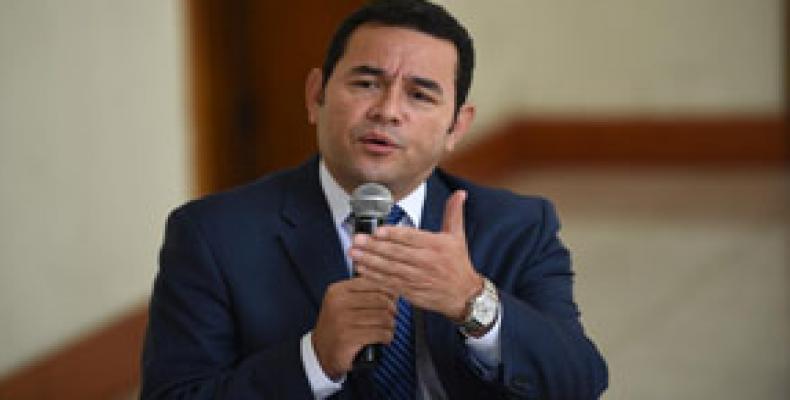Guatemala City, September 3 (RHC)-- Guatemalans staged a national march on Saturday following President Jimmy Morales’s decision to expel the United Nations-backed International Commission Against Impunity in Guatemala (CICIG). A broad cross-section of the country's social and political movements along with regular citizens have rejected the move, which has also been condemned by the United Nations and Guatemala’s political opposition, and have planned to unite in defense of CICIG the under the banner “Get Out Jimmy!”
Morales’ decision to not renew the work visas for the members of the CICIG came just days after Congress announced it would investigate Morales to determine whether or his immunity from prosecution should be lifted and possibly tried for illegal financing allegations during his 2015 election campaign.
The left-wing Convergencia party slammed the decision accusing Morales of trying “to guarantee impunity and corruption within the state.” While the Winaq political movement, founded by the 1992 Nobel peace prize winner Rigoberta Menchú, condemned Morales’ use of the country’s armed forces to deliver his announcement Friday. For Winaq, Morales' decision goes against “national interests, democracy, justice, and the rule of law.”
The Guatemalan National Revolutionary Unity, a political party that emerged from four demobilized guerrillas groups that fought against the United States-backed coup against Jacobo Arbenz and dictator Efrain Rios Montt, called on citizens to defend “their rights against the corrupt and thieves in government.”
The Front for Transparency also expressed its support for the CICIG, and said its presence is “fundamental until their investigative capacity is transferred to the Public Ministry.”
The Center for Justice and International Law (CEJIL), a human rights group based in the United States, also decried the move, arguing it “amounts to obstruction of justice and seeks to destabilize the country’s institutionality… The CICIG has been the cornerstone of the fight against corruption, and its dissolution is the most recent effort to consolidate impunity on numerous judicial processes for corruption.”
Investigations by the CICIG have implicated Morales and many of his close associates, including his brother and his son in cases of corruption. Morales’ son Jose Manuel and his brother Sammy are facing trial for defrauding the state in 2013.
This is not Morales’ first attempt to curtail investigations against him. Last year, he tried to expel Ivan Velasquez, head of the CICIG, from the country but was unable to do so after a Constitutional Court ruling.
And in 2017 Congress passed legislation that granted the president immunity against corruption or embezzlement inquiries. Human rights organizations, social movements, students, and regular citizens have organized massive protests late Saturday to reject the president’s decision in the streets and defend the battle against corruption.
If Morales is successful, the CICIG which was created in 2006 by the U.N. and the Guatemalan government to investigate high-levels of corruption within the country and links between the government and paramilitary groups, will have to leave the country in September 2019.


